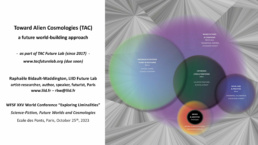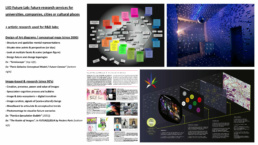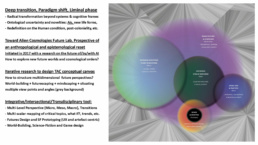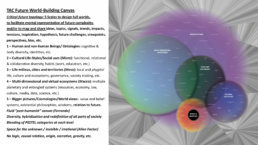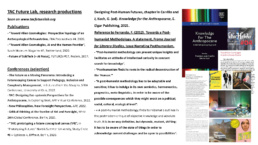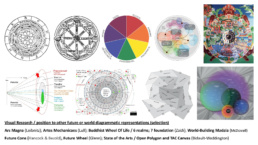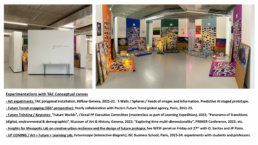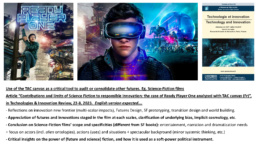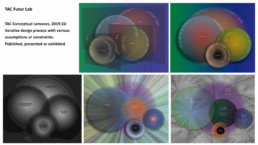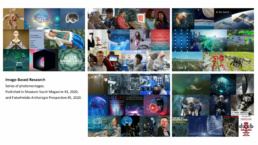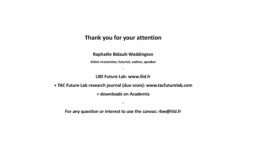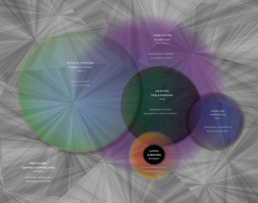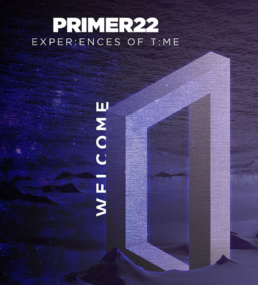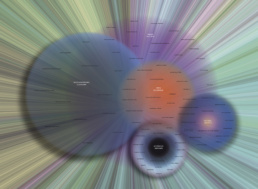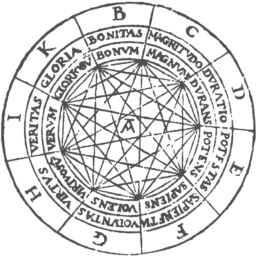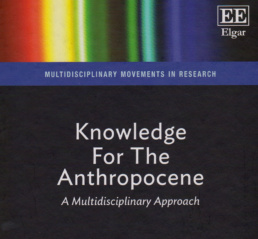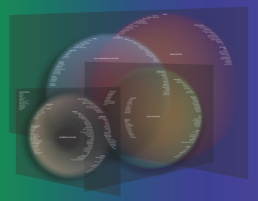Toward Alien Cosmologies (TAC)
a future world-building approach
“Exploring Liminalities”, 25th World Future Studies Federation Global Conference, Ecole des Ponts, Paris, 2023.
This intervention scheduled in the session 'Science-Fiction, Future Worlds & Cosmologies', is an opportunity to reposition the work of TAC Future Lab in the international future research agenda, and to clarify how the TAC Future Canvas contributes to the discipline’s response to the current paradigm shift - which futurists agree on.-The diagram proposes a new critical "topology" of the future, structured in 5 spheres / 5 scales (onto, micro, meso, macro, cosmo) of transformation, used to map current trends and transitions, or to design future worlds.–While rearticulating other prospective tools, the canvas also allows to integrate or re-envision other approaches of the future and of world-building.
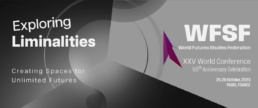
Abstract
In this presentation, we will clarify why the current paradigm shift and liminal stage call for the design of post-humanist future worlds, as open bigger pictures, in which future scenarios, trends, transitions, or strategies can unfold.
As we will show, the three large digital, environmental, and demographic transitions are in the process of disrupting western anthropological and epistemological foundations, and require new visions of the world and future cosmologies – the term is used here in its anthropological sense, i.e., as ways of ordering the world and giving meaning to existence.
The Anthropocene asks to reinvent the human condition on Earth, ranging from daily life-styles to our relation and thinking of nature, from urban ecosystems to the global economy, from legal frames to holistic global perspectives and including our relation to outer space, and the future horizon. Simultaneously, the digital transition is also impacting the entire society from most intimate aspect of life such as dating, to the geopolitical order, from work and business to education and health… The technological acceleration even generates new alien realities and ontologies such as AIs, xeno-bots, distributed autonomous organizations and metaverses becoming protagonists, stakeholders, and life-milieus to make a society and worlds with…
These extended transitional processes include revisiting all our rationalities, in search for new forms of post-colonial equities, imaginaries, and universalisms, while the global demography is also in deep transformation.
From that ecosystemic perspective, we will introduce a fluid and multiscalar matrix to design future worlds, resulting from an iterative methodological research process (initiated in 2017) and combining elements from foresight, futures design, world-building, Multi-Level Perspective, transition design and art.
RBW
Presentation slides
About "Exploring Liminalities", 25th WFSF Global Conference
Complex systems are predictable – until they are not! At a time of pan- and perma-crises… war-ridden continents, pandemic, climate change… that do not stand alone, but are intertwined and in complex relation with each other, feeding upon the disruption they engender individually and jointly, the fateful tipping point may indeed seem nigh. Whether the tipping point is before or behind us, we are certainly in a liminal state – a state of flux, in between worlds.
Liminality is a state of emergence and becoming. A state of possibilities and of transformations, as well as a state of radical uncertainty and not knowing. A state in which how we respond to the problem – as individuals, organisations, even society – may in fact be part of the problem! A state in which the tried and true may transform into the tired and treacherous. A state that requires new questions, new perspectives, new futures to explore.
The conference has two full days of presentations, networking and workshops at the École des Ponts Business School in Paris on the 25-27th October, and pre-conference side-events and activities on the 23-24th October. To celebrate the 50th Anniversary of the Federation, we are organising activities that reflect the past 50 years, and discuss the next 50 years.
We choose liminality as an organising concept for the conference to reflect on the liminalities we are experiencing today. As futurists, we are dealing with change, transformation and uncertainty, and as transitioning into new stages, we are often confronted with liminal spaces that exists between pasts and futures. We have a wide range of tools to explore future opportunities and prepare the present to transform into preferable futures. Our community of futurists is committed to practice futures studies and foresight in all areas of life, and always stay inclusive and open to all members of society. Our members are practicing futures studies and foresight in all levels of industry, government, NGOs, and also, make sure that education of all levels is also includes futures and futures thinking.
The aim of this conference is to bring together scholars, researchers, and practitioners from a wide range of disciplines to explore the concept of liminality and its implications for our understanding of human experience, identity, and culture. Through a series of presentations, workshops, and discussions, we hope to generate new insights, spark innovative ideas, and build a community of scholars and practitioners who are committed to exploring and practicing futures.
Conference program: wfsf2023paris.org
Session ‘Science-Fiction, Future Worlds and Future Cosmologies’ moderated by Thomas Lombardo, director of the Center for Future Consciousness
Research axes reminder
Axis 1: Transitions & Future Worlds
Axis 2: Foresight Methodology Innovation
Axis 3: Art & Future Research
Related articles
limit/no limit, Art & Design Research Conference, Paris, 2024
RBW zooms in on the TAC Future Lab work related to knowledge, whether it be the cognitive value of artistic formats,…
Artistic & Polygonal Research on Time multidimensionality, PRIMER, 2022
Exploring the future also means questioning the temporal architectures and frameworks on which human life is…
Future visualization experiments, Exploring Next, Association of Professional Futurists, 2022
This intervention zoomed in on the artistic aspects of TAC Future Lab and presents in detail the TAC Future Canvas and…
Ethics & Philosophy of Futures, Association of Professional Futurists, 2022
RBW introduced here the different philosophical references that irrigate the work of TAC Future Lab, whether in its…
Designing Post-Human Futures, Knowledge for the Anthropocene, 2021
This long essay lays the basis of TAC Future Lab methodological and transdisciplinary research, mixing learnings from…
‘Prototyping Futures’ Symposium, ‘Cybiosis’ Circle, NSU, Diffrakt, Berlin, 2020
This intervention was an opportunity to prefigure, share and discuss a first draft of the TAC Future Canvas, designed…
